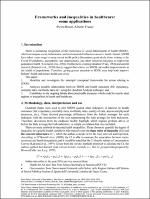Chapter Frameworks and inequalities in healthcare: some applications
Author(s)
Renzi, Pietro
Franci, Alberto
Language
EnglishAbstract
Background Social determinants of health (SDOH) have increasingly entered health policy conversations as a growing body of researches, reveal the direct relationship between social determinants and health outcome. In fact, the recent literature is moving from the traditional model that focus on how health affects economic status, to a new view that economic status affects health. Objectives To investigate the principal conceptual frameworks for action on social determinants of health. Another aim is to contribute on the ongoing discourse on feasible measures which could be used to alert regions to inequalities in the distribution of health. Methodology, Italian data are used as a demonstration. Quadrant charts illustrate associations between how much regions spend on health and how effectively health system functions. The relevant inequality measures are used to rank health inequalities. Main results Frameworks have been presented to help communities, health professionals and others begin to better understand and address a variety of factors that affects health. Quadrant analysis technique shows the extent to which spending more on health, translates into better health outcomes, higher quality of care and improve access to care across the Italian regions, whilst also recognition the importance of major risk factors. Conclusions The social inequalities in health and what this means for how we understand and reduce them, as not to date been compressively examined empirically. There is an urgent need to expand our knowledge with comparable data on health determinants and more refined health outcomes. Furthermore, there is a need for feasible inequality measures in the health information systems. The measures used in this study, provide a step to inform and guide the uptake of equity-sensitive policies.


 Download
Download Web Shop
Web Shop